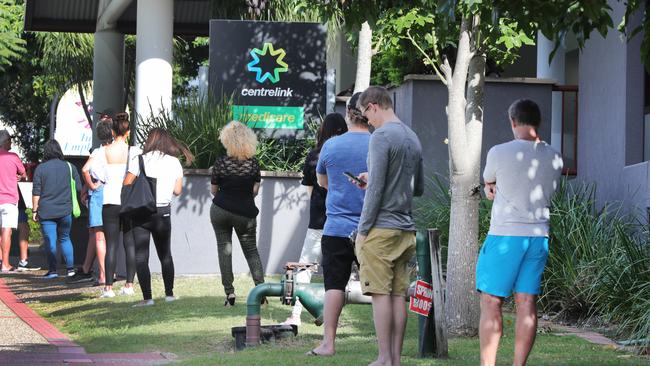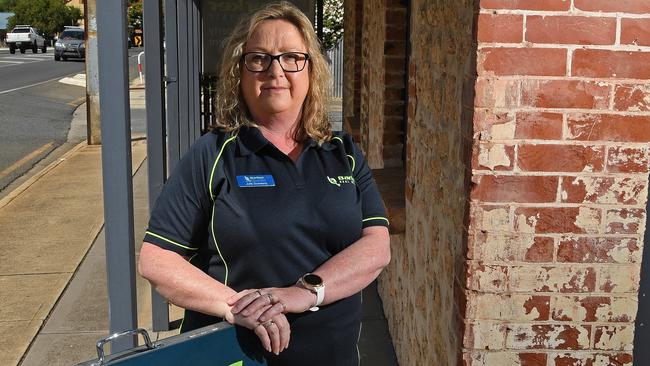JobKeeper end: Where to get help, next steps for workers and businesses
The JobKeeper era has ended and will have long-lasting impacts for many Australians. Here’s what you can do next.
Business
Don't miss out on the headlines from Business. Followed categories will be added to My News.
JobKeeper switches off Sunday, businesses will close and workers across Australia will be shunted into unemployment.
That’s a certainty, but much less certain what happens next for affected Australians and the overall economy after the $90 billion wage subsidy scheme ends.
Treasury Secretary Steven Kennedy told a Senate hearing this week that up to 150,000 workers were expected to lose their jobs and about 110,000 small businesses on JobKeeper were still suffering from a sharp downturn in turnover.
The Federal Government has announced extra assistance packages for tourism, aviation and the arts in recent weeks, but sectors such as hospitality must fend for themselves while coping with ongoing COVID restrictions on customer numbers.
Economists say recent stronger-than-expected economic data should result in fewer people joining jobless queues than was first feared, while financial counsellors and business specialists say there is help available for those who need it.
IMPACT ON INDIVIDUALS
Financial Counselling Australia CEO Fiona Guthrie said many people would move from JobKeeper to JobSeeker unemployment benefits “and that means they’ll have a lot less money to live on”.
“People in this situation are going to be very worried and might feel overwhelmed by it all,” she said.

“We’re expecting this will lead to increased demand for financial counsellors.”
Ms Guthrie said also ending soon were the $150-per-fortnight JobSeeker coronavirus supplement, bank loan deferrals, telecommunications company assistance and moratoriums on energy disconnections.
JobKeeper has been paying recipients up to $1000 a fortnight, while the new JobSeeker rate from April 1 is $620.80 a fortnight.
Depending on their situation, JobSeeker recipients may also get benefits including rent assistance of up to $187 a fortnight, Family Tax Benefit Part A of up to $246 per child each fortnight, and a Family Tax Benefit Part B payment of up to $161 per family each fortnight.
Ms Guthrie said people struggling to pay loans or bills should ask lenders and creditors about further assistance.
“Talk to your creditors about a hardship arrangement,” she said. “If they won’t assist or you need more help, talk to a free financial counsellor. You can do that by ringing the National Debt Helpline on 1800 007 007.”
Australian Military Bank CEO Darlene Mattiske-Wood said some JobKeeper recipients had been restructuring loans to reduce repayments.


“We recommend talking to a free financial counsellor and looking at useful information on websites such as the National Debt Helpline and Moneysmart, if you feel that you will be unable to meet your financial obligations when JobKeeper ends,” she said.
Property manager :Different’s head of customer experience, Shannyn Laird, said moratoriums on rental increases in several states would end soon, as would mortgage repayment relief, “which could add to mounting pressure”.
Ms Laird said renters who would struggle coming off JobKeeper should contact their property managers quickly.
“Put everything in writing and send them an email explaining your situation and ask to talk through options,” she said. “Provide evidence of your loss of income … this may help you negotiate a rent reduction.”
IMPACT ON BUSINESSES
While fresh financial support is available for some sectors, many business owners are on their own after Sunday.
Council of Small Business Organisations of Australia CEO Peter Strong said his biggest concern was for independent contractors and small businesses that employed just one or two staff.
“People hang on for too long, so it won’t be a cliff – it might be a slow fall,” he said.
Mr Strong said he hoped those in real trouble were already looking for other work, because trying in vain to continue after JobKeeper could lose them more money.
“If you have to close, close. It’s no embarrassment or failure.”

Business Australia chief customer experience officer Richard Spencer said most businesses would have to be cautious and flexible while fending for themselves.
“Financial support is still available through federal, state and local government, as well as non-government channels,” he said.
“The Government’s recently announced an extension to SME Recovery Loan Scheme will provide continued assistance to help businesses access finance to maintain and grow when JobKeeper ends.
“Loans that are backed by this scheme will be available through participating commercial banks and lenders.”
ECONOMIC IMPACT
AMP Capital chief economist Shane Oliver said 100,000 jobs might disappear but 88,000 new ones were created last month alone.
“I know a lot of people are concerned but the reality is JobKeeper’s done its job and enabled the economy to reopen fairly successfully,” Dr Oliver said.
“I think the impact will be relatively minor – the latest unemployment rate of 5.8 per cent is a level no one expected to fall to this quickly.”
A new survey by investment giant UBS says Australians’ spending intentions remain high despite JobKeeper ending, and fewer people are concerned about losing their job.
“Those on JobKeeper also expect a rebound in their income … suggesting they are positive on
returning to work,” it says.
WHERE TO GET HELP
• Centrelink has information about unemployment benefits, family payments and other income support.
• Call the National Debt Helpline on 1800 007 007 to speak with a free financial counsellor or visit ndh.org.au.
• Moneysmart.gov.au has advice, details of assistance, advice and links to other websites for further help.
• Business.gov.au has information about Federal Government assistance, mental health support, plus links to state COVID initiatives for businesses and sole traders.
• Contact your bank or other lender to learn about hardship assistance programs.

TRAVEL AGENT’S CAREER UNCERTAINTY
Travel agent Julie Dumesny has been grateful for JobKeeper’s help over the past year but the uncertainty surrounding her industry has forced her to seek part-time work elsewhere.
As international travel bans continue, Ms Dumesny said she and her colleagues loved the industry but their employer had suggested staff seek other work to lift their income.
“They can’t borrow money, as the government is suggesting, because the length of time before they generate any income is so uncertain,” she said.
The return of international travel to pre-COVID levels was “out of our control totally”, Ms Dumesny said.
“We might hope by June or July of 2022 but more likely it could be 2023 or even 2024 depending on the perception of clients as to their safety to travel internationally.”
Ms Dumesny has found part-time work with a real estate agent and is unsure if it will become a permanent career change because of travel’s uncertainty.
“We’re finding it hard to believe our situation hasn’t been recognised by the Government,” she said.
“We’re a small businesses which has struggled with overheads of rent, telephone, internet and computer expenses, electricity and insurance, while trying to look after our clients’ refunds or future credits.”
Originally published as JobKeeper end: Where to get help, next steps for workers and businesses
Read related topics:Explainers



